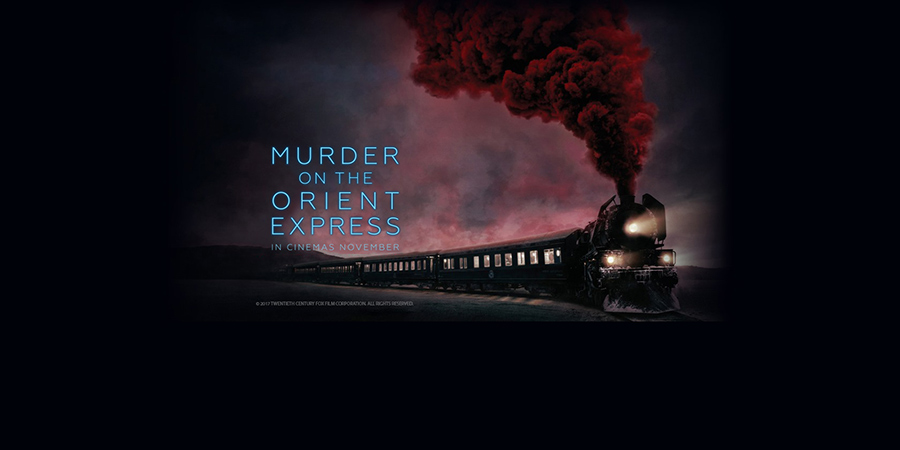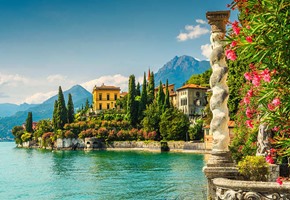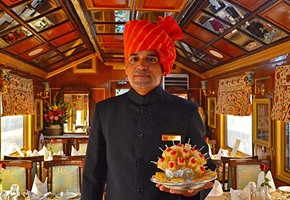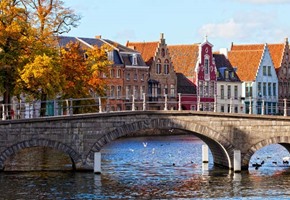When Kenneth Branagh's action-man Hercule Poirot first bounds
onto the screen, we find ourselves in Jerusalem 1933. And while
this is sure to be an unfamiliar opening to many of Christie's more
avid readers, we're soon back into comfortable territory as
Poirot's sense of self-importance and masterful pomp come bubbling
to the surface during his self-absorbed denouement. He seems to
take great glee in wheedling out the unsuspecting culprit of a
local theft, and performs to his crowd with childlike enthusiasm,
knowing he is the true master of the 'little grey cells'. But after
all that hard work, the great detective is in need of a well-earned
holiday, and what could be better than the luxury (where his boiled
eggs are bound to be just the right size and consistency) of the
Orient Express? A relaxing week reading Dickens and indulging
amongst the opulent surroundings of the world's most famous train
sounds just like what the doctor ordered, and handily there is one
on board, Dr. Arbuthnot, played by Leslie Odom Jr. (A minor
character change from the colonel of the original.) Though
unfortunately for our favourite Belgian, his first professional
duty isn't that of prescribing some R and R, but rather identifying
the dead body of antiques dealer, Edward Ratchett.
Invariably just before this macabre discovery takes place, the
debonair yet evidently devious Ratchett (who has been receiving
mysterious death threats), played with confident charisma by Johnny
Depp, corners the unflappable Poirot over desert and demands the
number one sleuth become his private bodyguard. Money is
mysteriously no object.
In Branagh's version, in which he not only plays Hercule himself but also directs and shares a producing credit, the train plays almost as much a starring role as any of the actors. The cinematography is ingenious too, with filming techniques giving us a sense of, to begin with, the excitement and bustle of being on the Orient Express during the Golden Age of travel. As Hercule makes his way through the carriages for the first time, we see chefs in starched whites flambéing, the measured (literally) precision of setting the tables for dinner and the extra flourishes that go in to making up the first class cabins. But as the film wears on, each twist taking the audience down an ever darker and puzzling path, the angles become more acute giving us a sense of the claustrophobia and cabin fever each of the passengers must be experiencing, trapped in a snow drift high in the Swiss Alps.
Poirot uses this to his advantage however, interviewing each of the possible murderers separately, adapting his style to try and make them uncomfortable, thus forcing them give something away unwittingly. And what a star-studded list of suspects it is, with Daisy Ridley playing the demure governess Mary Debenham, though in this more modern version she's been given a bit of an activist revamp, demonstrating at one point the ills of race prejudice to Willem Dafoe's Gerhard Hardman. Then there's the elegant Princess Dragomiroff and her wallflower maid, Hildergarde Schmidt, played by national treasure Judi Dench and Olivia Coleman respectively. Next on the whodunnit line-up is Michelle Pheiffer's husband-hunting Caroline Hubbard, Ratchett's assistant Hector Macqueen (Josh Gad) as well as his Valet, Edward Henry Masterman, masterfully portrayed by the experienced Derek Jacobi. And last but not least, we have Penélope Cruz's Pilar Estravados (a name borrowed from another yarn, Hercule Poirot's Christmas), replacing the Swedish missionary and nurse, Greta Ohlsson.
It wouldn't be a true Agatha Christie murder mystery if not all the characters thrown together by happenstance and coincidence had a motive for bumping off Ratchett, who was in procession of a murkier past than he let on to of course. But the discovery of his body, stabbed frenziedly a dozen times, doesn't follow the usual trope of a screaming maid dropping the breakfast tray, instead being dealt with more conservatively. We don't see the body straight away but enjoy an unusual bird's eye view of the chaos that comes along with encountering a murder scene. Then before anybody can come to terms with what's taken place, further disaster strikes in the form of a powerful avalanche that strands the Orient Express, and all the drama taking place on board, atop a precarious wooden railway bridge. Whilst some of these external shots are by far and away the most impressive, it is a nerve-bitingly frosty chase scene out in the snow that rings the least true, the idea of Hercule Poirot engaging in fisticuffs is unthinkable to most die-hard fans. Though, with no Captain Hastings or Inspector Japp on hand to tackle potential scoundrels, it is understandable.
There are a few other aspects which stop this film being at the
very top of its game. For example, it never feels like we spend
quite enough time with each character, getting to grips with their
various backstories and foibles - something that would assist the
impact of the final reveal. And this wouldn't be a proper review if
we didn't talk about Poirot's contentious new moustache.
An extension of his ego, Hercule Poirot takes great pride in his
moustaches, and is often scathingly critical of others' facial
hair. This production however takes things to greater extremes than
any other film or televisual representation, with each salt and
pepper-flecked whisker reaching right around the side of Branagh's
face. Nicknamed 'the badger' by cast and crew, it is almost so
large as to be distracting but, unlike the killer, just about
manages to get away with it.
Overall this is a sophisticated piece of filmmaking that retains all the necessary elements of a traditional thriller, whilst dispensing with some of the more dated attributes not as stark to readers/viewers in 1934 or 1974. A stirring score keeps the suspense right on track, and the final reveal is as surprising as ever, to those not already in on the secret of course. We are treated to slightly less explanation of Poirot's ingenious untangling than many would like, but a film that leaves you wanting more can't be a bad thing. And more is exactly what's hinted at in the final scene, following reports of dastardly deeds taking place on the Nile….
Murder on the Orient Express is showing at cinemas nationwide now.





